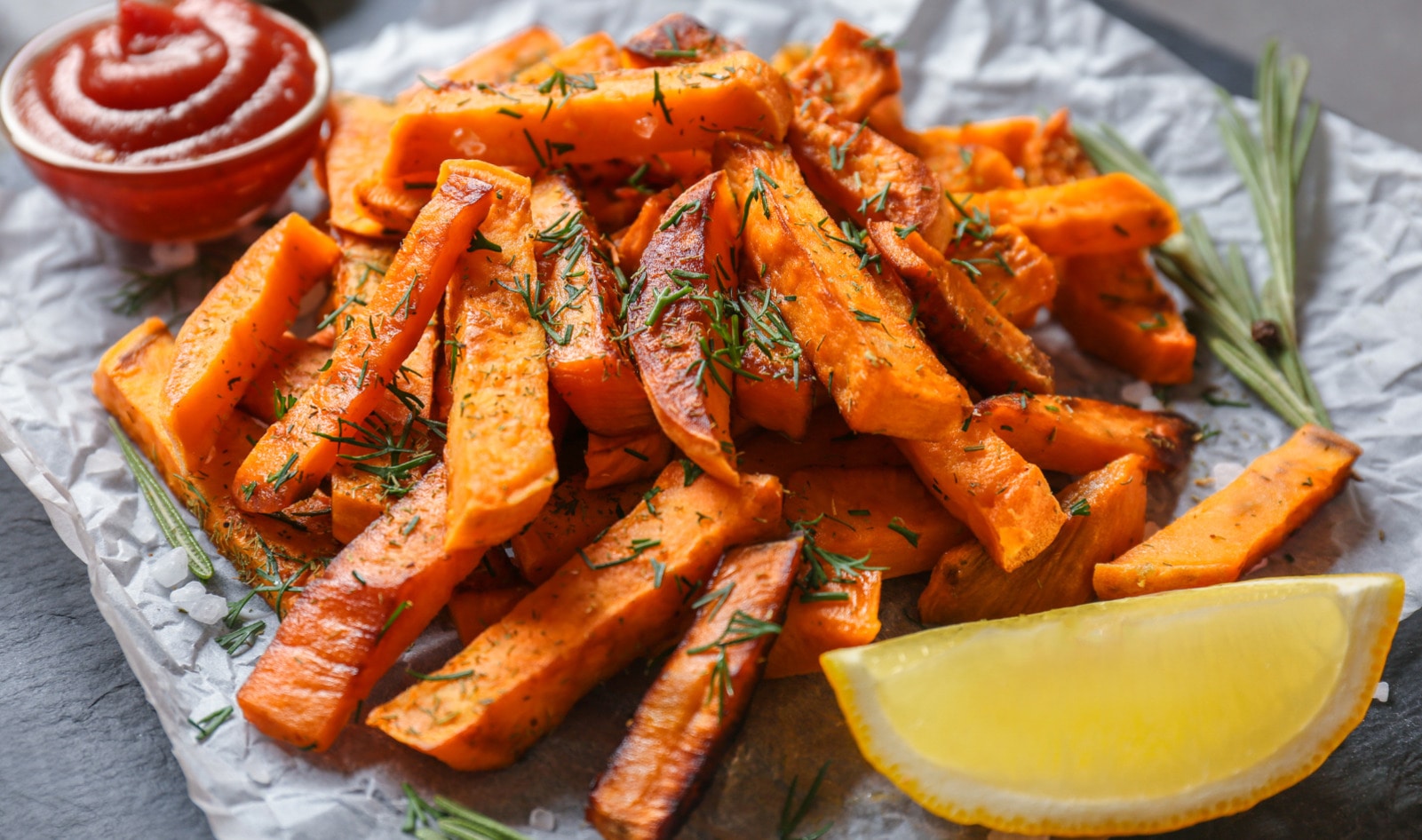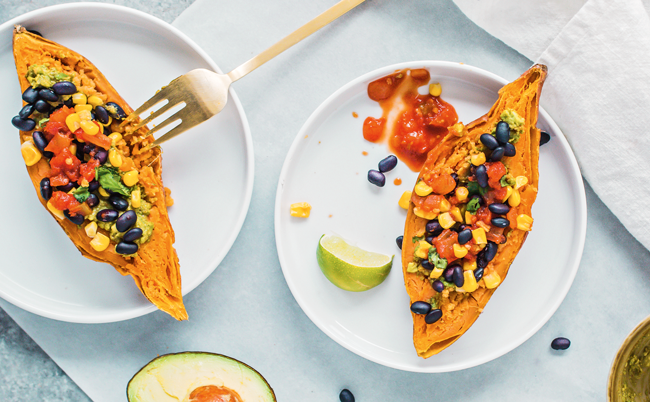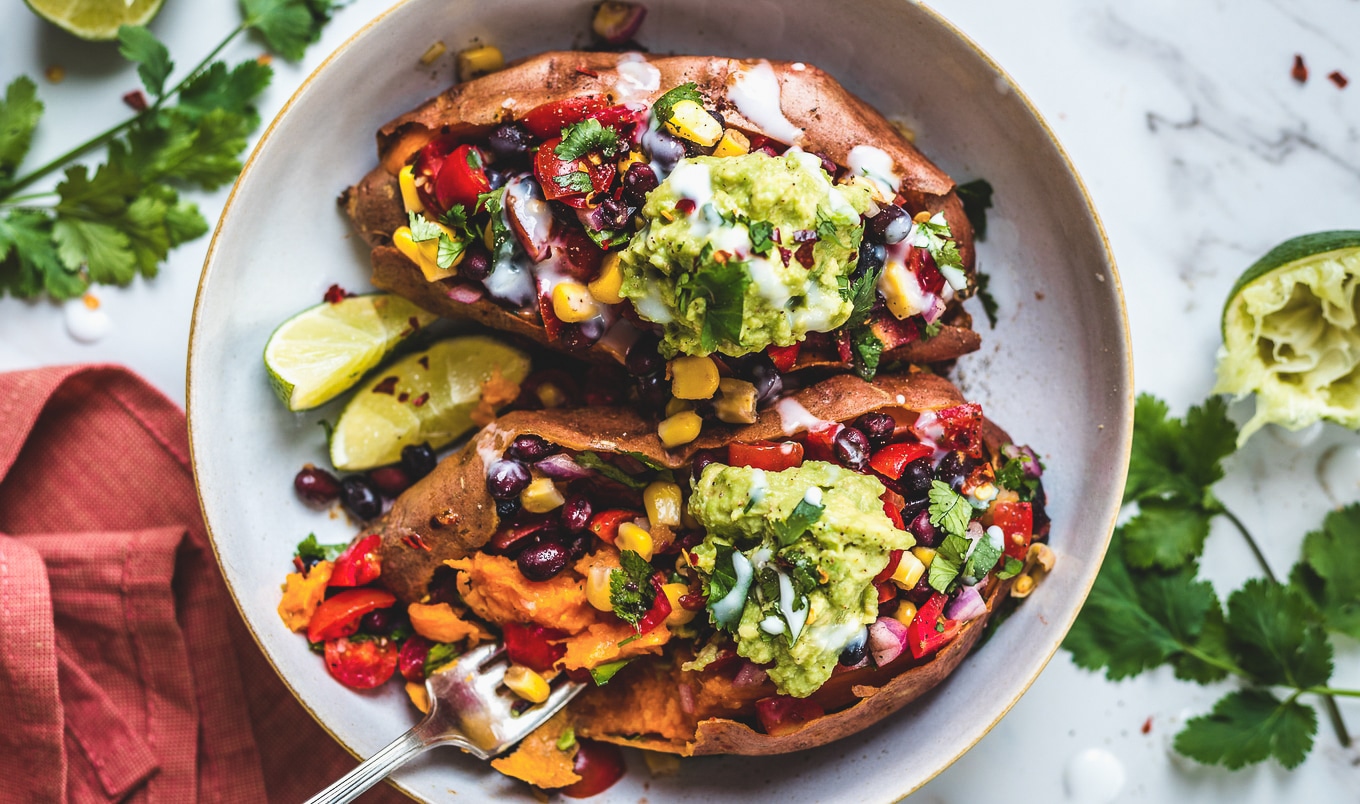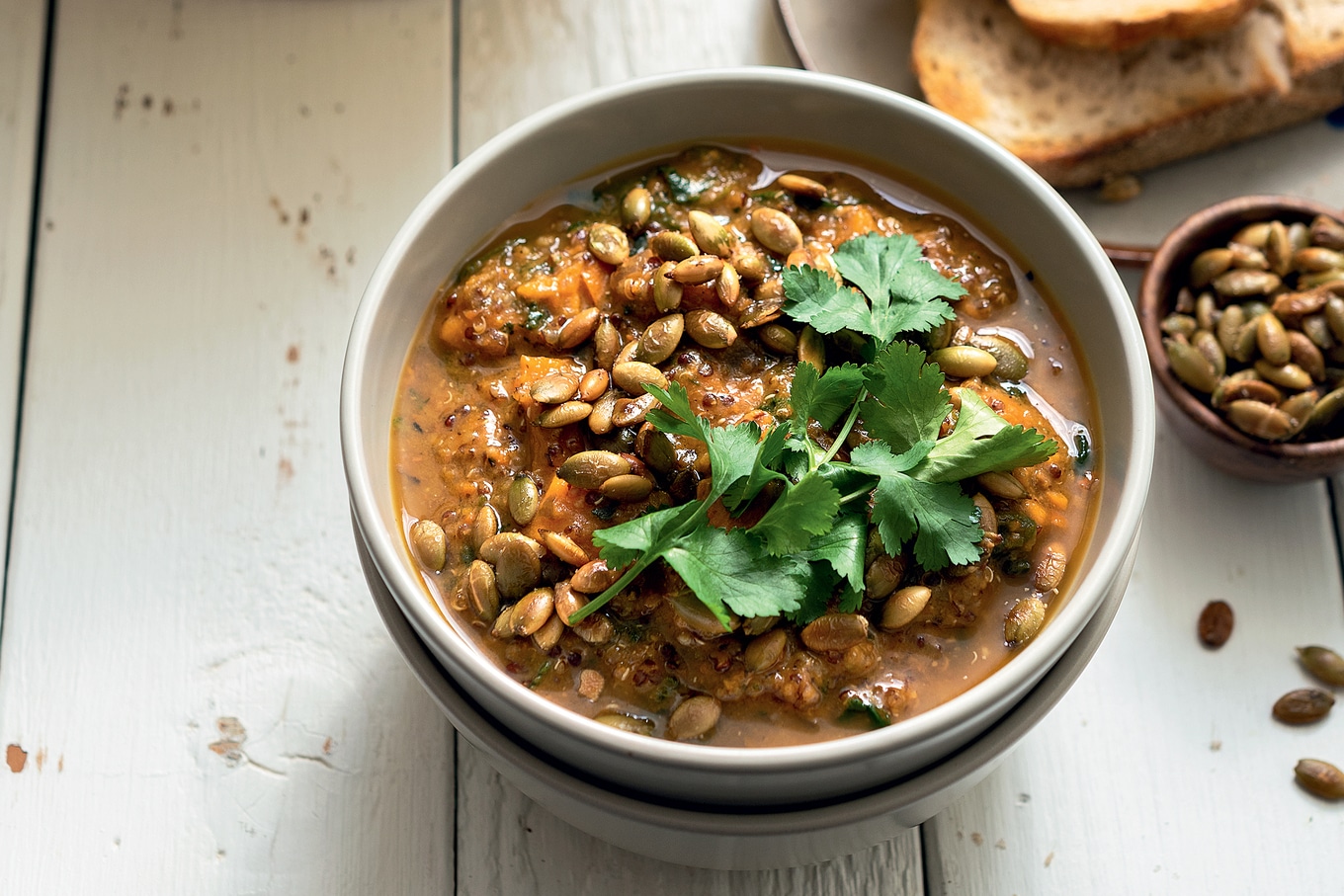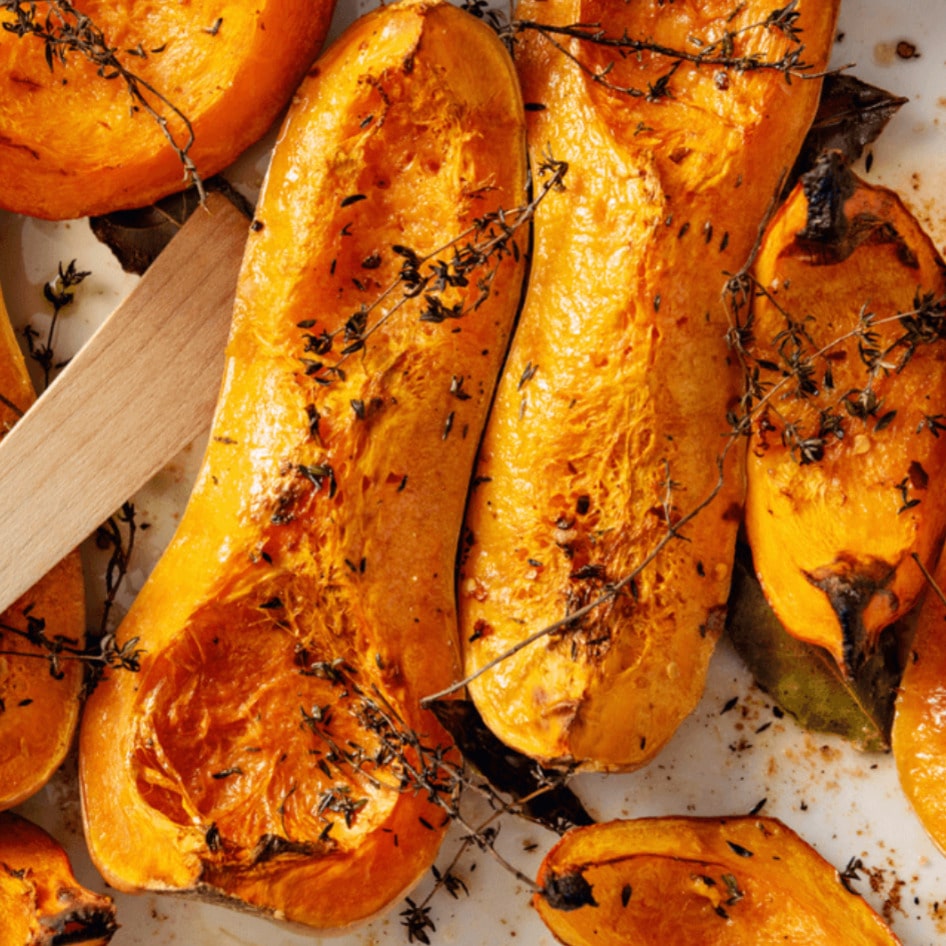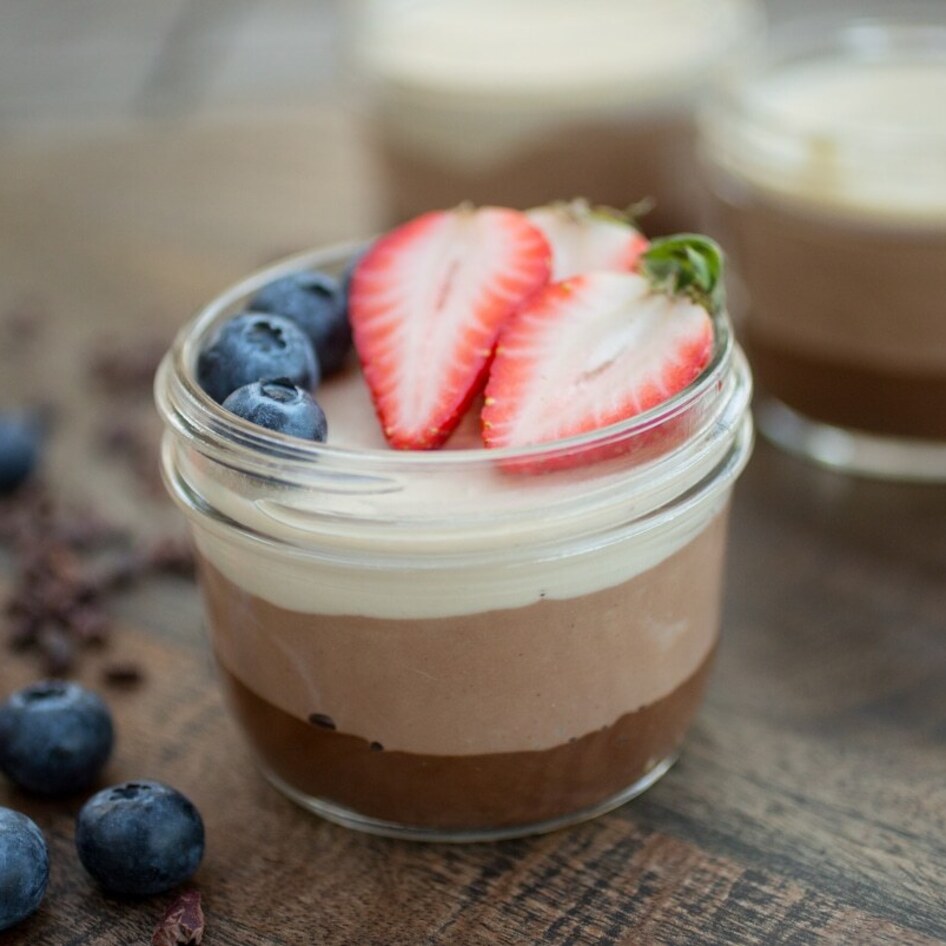“Superfood” is a word that gets easily tossed around these days, from $15 açaí bowls to $18 batches of granola with goji berries and cacao nibs. But, technically, “superfood” is nothing more than a marketing term. In essence, it’s any nutrient-dense food that comes with health benefits, regardless of price. During the winter, our attention is on sweet potatoes—the affordable root vegetable that’s packed with health benefits.
Although sweet potatoes are available all year round, they’re most often associated with fall and winter flavors. The cooler months inspire us to use it in a variety of dishes, like sweet potato pancakes—vegan, of course.
Sweet potato nutrition
Sweet potatoes are highly nutritious and packed with a variety of vitamins, minerals, and other beneficial plant compounds.
They’re a good source of carbohydrates, which provide the body with energy, as well as vitamins A, C, and B6, plus manganese and potassium. Like white potatoes, sweet potatoes are more nutritious when you leave the skin on.
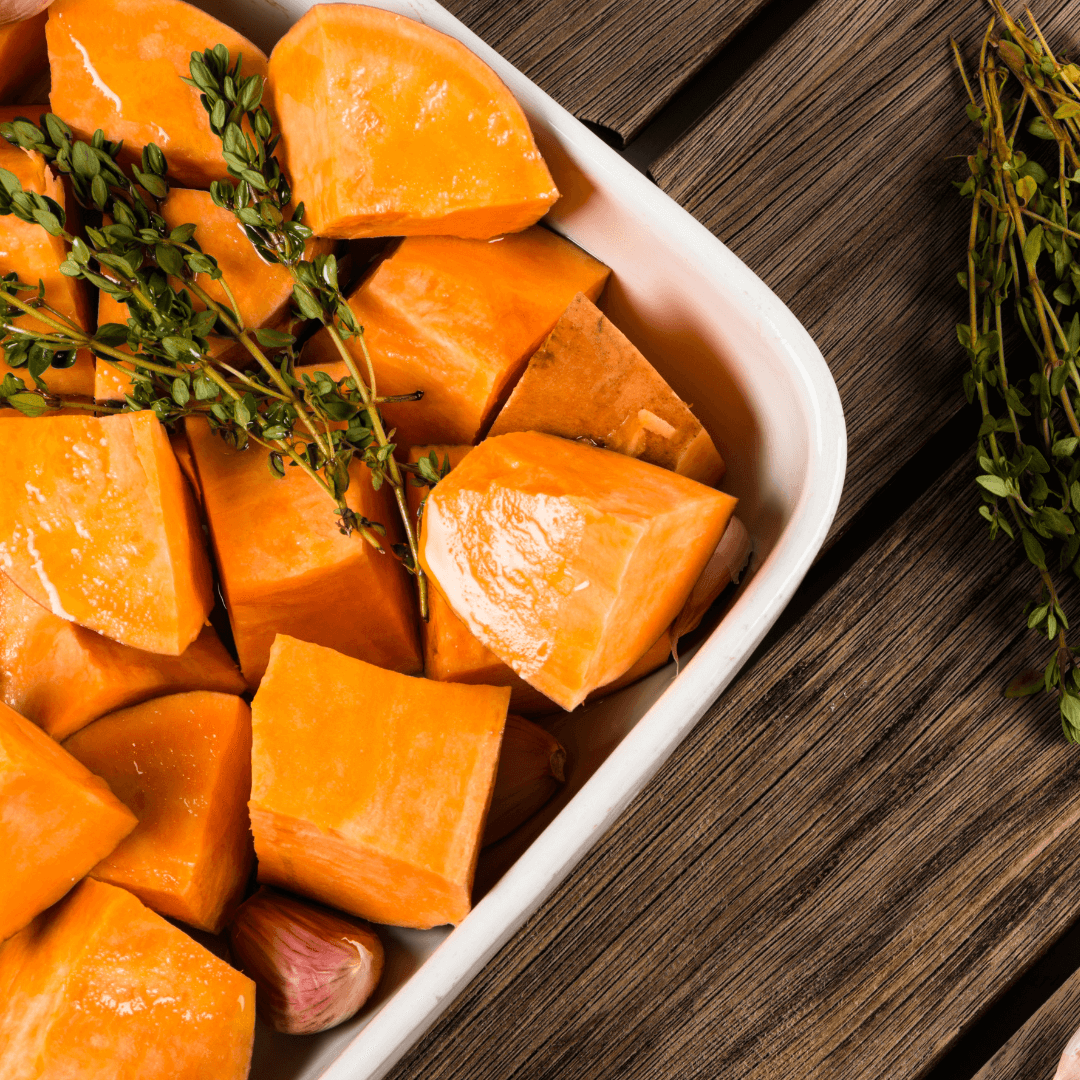 Canva
Canva
“Sweet potatoes contain multiple health benefits,” Rhyan Geiger, RDN, and founder of Phoenix Vegan Dietitian, tells VegNews. “[These include] reducing cancer risk due to the pigment called beta-carotene, improving digestion and regularity from the fiber content, maintaining eye health because of the high amounts of vitamin A, and boosting immunity because of its vitamin C content. Overall, it’s a delicious nutrient-dense option.”
BECOME A VEGNEWS VIP: Get exclusive product deals, freebies, and perks galore!
5 health benefits of sweet potatoes
In the kitchen, sweet potatoes—which are often mistakenly called yams—are a delicious multi-tasking ingredient that also happen to be very good for you. Even better, they tend to be on the affordable side, ranging from $0.75 to $1.80 per pound on average, according to cost information website, ThePricer. Below, we’ll go through the health benefits of sweet potatoes, plus ways to use them this season.
 Canva
Canva
1 Anti-inflammatory
Beta-carotene, a natural pigment found in orange-fleshed sweet potatoes, all kinds of winter squash, and carrots, is known to help lower inflammation. Chronic inflammation is associated with a higher risk of heart disease, cancer, arthritis, and Crohn’s disease.
The same goes for anthocyanins, a flavonoid that’s responsible for vibrant red and purple colors in fruit and vegetables, like purple sweet potatoes. A study of Taiwanese purple sweet potatoes suggests that the plant’s extracts could even be used in anti-inflammatory and anticancer treatments.
2 Good for gut
Sweet potatoes are great sources of dietary fiber, an indigestible carbohydrate that feeds the friendly bacteria in your gut. “Some studies have also shown that sweet potatoes can promote the growth of healthy gut bacteria,” Geiger adds.
These starchy root vegetables actually contain two types of fiber: soluble and insoluble. Soluble fiber increases healthy gut bacteria, which in turn, help improve digestion. Meanwhile, insoluble fiber helps prevent constipation. Overall, eating enough fiber is associated with a lower risk of colorectal cancer.
Fiber is also known to lower your risk of chronic health conditions, such as heart disease and Type-2 diabetes.
 Canva
Canva
3 Good for eye health
Sweet potatoes contain a lot of beta-carotene, which the body converts into vitamin A, which is essential for preserving your vision and protecting against night blindness with age.
A study published in the journal Clinical Interventions in Aging suggests that beta-carotene and vitamin E—which sweet potatoes are also a rich source of—both play a key role in eye health and could help guard against age-related eye disease.
4 Boosts immune system
Vitamin A plays a lot of roles in your overall health. This important micronutrient also helps ensure that your body’s natural defense system functions properly, thanks to its anti-inflammatory properties.
Specifically, vitamin A helps maintain mucous membranes that trap bacteria and other harmful microorganisms. It also helps the body produce white blood cells, which travel through your body, protecting it from invading microbes like bacteria, fungi, and parasites.
An analysis of vitamin A’s benefits suggests that it may be beneficial in the treatment of various diseases because of its effect on the immune system. More research is needed, but it predicts that vitamin A will eventually make its way to modern therapies.
 Canva
Canva
5 Improves skin health
“Sweet potatoes have carotenoids, or the pigments that give them their orange color,” Geiger says. “Our bodies turn these carotenoids into vitamin A, which plays an important role in maintaining healthy skin.”
Topical vitamin A—known as retinol—is commonly used in skincare products to treat acne, improve elasticity, and reduce hyperpigmentation from sun damage.
Sweet potatoes can also help improve acne, which is an inflammatory skin disorder. A study published in the Journal of Cutaneous and Ocular Toxicology suggests that deficiencies in vitamins A and E can make acne more severe. It recommends eating more whole-foods rich in these nutrients to reduce how bad the flare-up is.
Both orange and purple sweet potatoes (thanks to their anthocyanins) can also help improve psoriasis symptoms. This autoimmune disease is characterized by dry, itchy patches of skin.
6 Contains antioxidants
As stated above, both orange and purple sweet potato varieties contain different types of antioxidants.
Antioxidants are compounds found in plant foods that inhibit oxidation, which causes the production of unstable molecules called free radicals. It’s believed that free radicals play a role in cancer, heart disease, and stroke.
Sweet potatoes are proof that superfoods don’t need to come with a high price. Geiger suggests embracing their versatility. “Potatoes are so versatile they can be prepared in many ways and transformed into almost any dish,” she adds. Boil them, mash them, air-fry them, roast and stuff them, make fries, add them to chili—if you aren’t already cooking with sweet potatoes, now is the time to start.
5 sweet potato recipes
Ready to try your hand at cooking up a delicious meal using sweet potatoes? Check out the below recipes.
 Jeff Wysocarski
Jeff Wysocarski
1 Vegan Sweet Potato and Sausage Enchiladas
These easy, smoky-spicy Mexican-style enchiladas can be made on Sunday as a meal prep for the entire week.
Get the recipe
2 Loaded Southwestern Sweet Potato Boats
These sweet potato boats with zesty Southwestern flavors come together in no time.
get the recipe
3 Vegan Black Bean-Stuffed Sweet Potatoes With Coconut Sour Cream and Guacamole
Easy to customize with your favorite ingredients, this stuffed sweet potato recipe is a versatile recipe for every week.
get the recipe
4 Vegan Smoky Sweet Potato Soup
Craving something hearty for the fall weather? This smoky soup is full of autumnal flavors and nutritious ingredients.
get the recipe
5 Vegan Sweet Potato Brownies
Think sweet potatoes can only be used for savory dishes? These brownies proved sweet potatoes are a versatile vegetable for any meal.
get the recipe
For more on vegan nutrition, read:
JUMP TO ... Latest News | Recipes | Guides | Health | Subscribe

